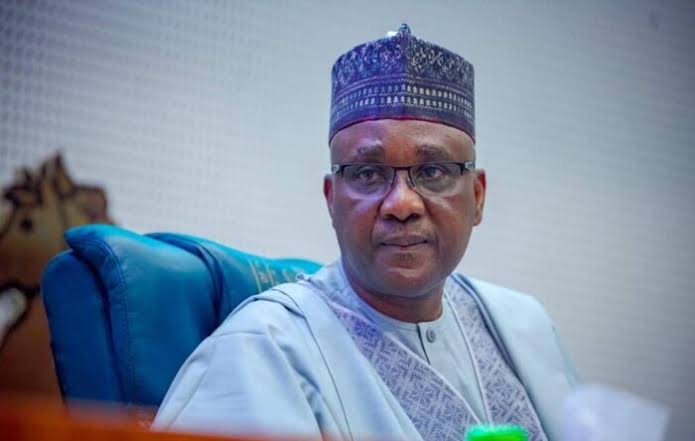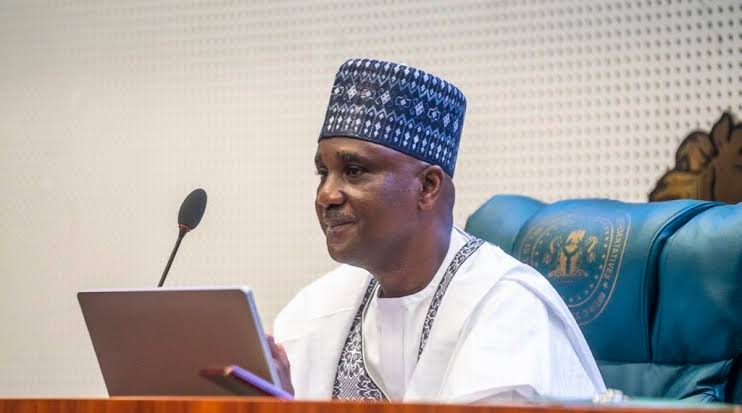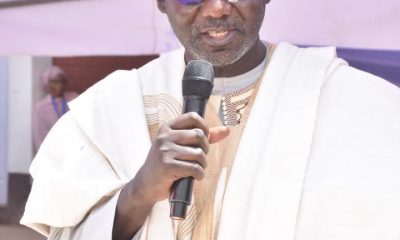Business
Agbese under fire over false allegations against NNPCL, NMDPRA

Agbese under fire over false allegations against NNPCL, NMDPRA
The Energy Transparency Initiative (ETI) has expressed dismay over the recent statements made by the Deputy Spokesman of the Federal House of Representatives, Philip Agbese, concerning the Nigerian National Petroleum Corporation Limited (NNPCL) and the Nigerian Midstream and Downstream Petroleum Regulatory Authority (NMDPRA).
The group in a statement by its convener, Ganzallo Gbenga, and programme officer, Chinelo Ochiaga, said the allegations by Agbese that the NNPCL and NMDPRA are involved in a deliberate attempt to undermine the Dangote refinery, is an affront to the House of Representatives.
They noted that such remarks are not only misleading but also demonstrate a concerning departure from his responsibilities as a federal lawmaker.
“While we are not willing to be mouthpiece of both regulatory authorities, being accused by Mr Agbese, we cannot but remind Nigerians that as an organization with over a decade of involvement in series of advocacy on transparency and accountability in the sector, we have full knowledge of issues that are responsible for the recent dispute between Dangote Refinery and the regulatory authorities.
“It is troubling that Agbese has chosen to abandon his duty as a representative of the people and instead assumed the role of an advocate for the Dangote Refinery.
“His position should obligate him to act impartially, especially in matters involving multiple stakeholders. By aligning himself so closely with a single business interest, he undermines the very essence of his role as an unbiased arbitrator within any relevant committee.
“In the House of Reps, his voice has never been heard, no bills sponsored, no motions moved and has also not carried out empowerment to his Constituency.
“Agbese’s actions reveal a troubling pattern of prioritizing the interests of a single entity over the broader collective welfare of Nigerians. The Dangote refinery, while a significant player in the industry, represents individual business interests that do not necessarily align with the national interest.
“The apparent bias demonstrated by Agbese risks neglecting the broader implications of the refinery’s operations on the general populace and undermines the regulatory framework designed to ensure fair play and transparency.
“It is imperative to remind the lawmaker that his call for the dismissal of the Group Chief Executive Officer of NNPCL and the Authority Chief Executive of NMDPRA is not only misplaced but lacks merit.
“We had expected all parties involved in this NNPCL and Dangote feud to maintain their silence but were shocked to realise that Agbese who’s a member of the committee set up by the House to investigate surrounding allegations chose to take a side and has made statement that are uncalled for.”
The Energy Transparency Initiative said Agbese needs to be schooled on how both the NNPCL and NMDPRA works and not dabble into affairs that are beyond his literacy level.
The group noted that the era where Agbese blackmails public institutions will not fly with government agencies as they won’t succumb to such.
“The agencies targeted for blackmail and pecuniary gains by Agbese and his team have outlived governments and individuals and will continue to do so continue, no matter the corporate or legislative blackmail.
“The oil and gas sector business is too sophisticated a knowledge for Agbese to understand and meddle into. We urge him to immediately resign his position as the Deputy Spokesperson of the House of Representatives.
“He can also chose to apply for employment in NNPCL if he choses to defend them, especially now that the recruitment exercise is ongoing.
“We call on the leadership of the House of Representatives to address this matter with the seriousness it deserves. It is crucial that members of the House focus on their legislative duties and refrain from interfering in regulatory issues they do not fully understand.
“This will ensure that the integrity of the legislative process is maintained and that public trust is upheld,” it said.
The Energy Transparency Initiative urged the House leadership to rein in Agbese and his associates.
“Their current approach not only jeopardizes the effective functioning of regulatory bodies but also risks undermining the efforts to achieve transparency and accountability in the oil and gas sector.
“We further implore all stakeholders to remain vigilant and uphold the principles of fairness and transparency.
“The progress of Nigeria’s oil and gas sector depends on the collective efforts of all parties involved, and it is imperative that individual agendas do not derail this important endeavor.
“The Energy Transparency Initiative shall remain committed to advocating for due process, transparency, and security in the oil and gas sector.
“We will continue to monitor developments and ensure that all actions and policies are aligned with the national interest, free from undue influence or partisan agendas.”
Bank
Alpha Morgan to Host 19th Economic Review Webinar

Alpha Morgan to Host 19th Economic Review Webinar
In an economy shaped by constant shifts, the edge often belongs to those with the right information.
On Wednesday, February 25, 2026, Alpha Morgan Bank will host the 19th edition of its Economic Review Webinar, a high-level thought leadership session designed to equip businesses, investors, and individuals with timely financial and economic insight.
The session, which will hold live on Zoom at 10:00am WAT and will feature economist Bismarck Rewane, who will examine the key signals influencing Nigeria’s economic direction in 2026, including policy trends, market movements, and global developments shaping the local landscape.
With a consistent track record of delivering clarity in uncertain times, the Alpha Morgan Economic Review continues to provide practical context for decision-making in a dynamic environment.
Registration for the 19th Alpha Morgan Economic Review is free and can be completed via https://bit.ly/registeramerseries19
It is a bi-monthly platform that is open to the public and is held virtually.
Visit www.alphamorganbank to know more.
Business
GTBank Launches Quick Airtime Loan at 2.95%

GTBank Launches Quick Airtime Loan at 2.95%
Guaranty Trust Bank Ltd (GTBank), the flagship banking franchise of GTCO Plc, Africa’s leading financial services group, today announced the launch of Quick Airtime Loan, an innovative digital solution that gives customers instant access to airtime when they run out of call credit and have limited funds in their bank accounts, ensuring customers can stay connected when it matters most.
In today’s always-on world, running out of airtime is more than a minor inconvenience. It can mean missed opportunities, disrupted plans, and lost connections, often at the very moment when funds are tight, and options are limited. Quick Airtime Loan was created to solve this problem, offering customers instant access to airtime on credit, directly from their bank. With Quick Airtime Loan, eligible GTBank customers can access from ₦100 and up to ₦10,000 by dialing *737*90#. Available across all major mobile networks in Nigeria, the service will soon expand to include data loans, further strengthening its proposition as a reliable on-demand platform.
For years, the airtime credit market has been dominated by Telcos, where charges for this service are at 15%. GTBank is now changing the narrative by offering a customer-centric, bank-led digital alternative priced at 2.95%. Built on transparency, convenience and affordability, Quick Airtime Loan has the potential to broaden access to airtime, deliver meaningful cost savings for millions of Nigerians, and redefine how financial services show up in everyday life, not just in banking moments.
Commenting on the product launch, Miriam Olusanya, Managing Director of Guaranty Trust Bank Ltd, said: “Quick Airtime Loan reflects GTBank’s continued focus on delivering digital solutions that are relevant, accessible, and built around real customer needs. The solution underscores the power of a connected financial ecosystem, combining GTBank’s digital reach and lending expertise with the capabilities of HabariPay to deliver a smooth, end-to-end experience. By leveraging unique strengths across the Group, we are able to accelerate innovation, strengthen execution, and deliver a more integrated customer experience across all our service channels.”
Importantly, Quick Airtime Loan highlights GTCO’s evolution as a fully diversified financial services group. Leveraging HabariPay’s Squad, the solution reinforces the Group’s ecosystem proposition by bringing together banking, payment technology, and digital channels to deliver intuitive, one-stop experiences for customers.
With this new product launch, Guaranty Trust Bank is extending its legacy of pioneering digital-first solutions that have redefined customer access to financial services across the industry, building on the proven strength of its widely adopted QuickCredit offering and the convenience of the Bank’s iconic *737# USSD Banking platform.
About Guaranty Trust Bank
Guaranty Trust Bank (GTBank) is the flagship banking franchise of GTCO Plc, a leading financial services group with a strong presence across Africa and the United Kingdom. The Bank is widely recognized for its leadership in digital banking, customer experience, and innovative financial solutions that deliver value to individuals, businesses, and communities.
About HabariPay
HabariPay is the payments fintech subsidiary of GTCO Plc, focused on enabling fast, secure, and accessible digital payments for individuals and businesses. By integrating payments and digital technology, HabariPay supports innovative services that make everyday financial interactions simpler and more seamless.
Enquiries:
GTCO
Group Corporate Communication
[email protected]
+234-1-2715227
www.gtcoplc.com
Business
BUA Group, AD Ports Group and MAIR Group Launch Strategic Plan for World-Class Sugar and Agro-Logistics Hub at Khalifa Port

BUA Group, AD Ports Group and MAIR Group Sign MoU to Explore Collaboration in Sugar Refining, Agro-Industrial Development, and Integrated Global Logistics Solutions
Abu Dhabi, UAE – Monday, 16th February 2026
BUA Group, AD Ports Group, and MAIR Group of Abu Dhabi today signed a strategic Memorandum of Understanding (MoU) to explore collaboration in sugar refining, agro-industrial development, and integrated global logistics solutions. The partnership aims to create a world-class platform that strengthens regional food security, supports industrial diversification, and reinforces Abu Dhabi’s position as a hub for trade and manufacturing.
The proposed collaboration will leverage BUA Group’s industrial and logistics expertise, Khalifa Port’s world-class infrastructure, and AD Ports Group’s operational experience. The initiative aligns with the objectives of the UAE Food Security Strategy 2051, which seeks to position the UAE as a global leader in sustainable food production and resilient supply chains. It also aligns with Nigeria’s food production- and export-oriented agricultural transformation agenda, focused on scaling domestic capacity, strengthening value addition, improving post-harvest logistics, and unlocking new markets for Nigerian produce across the Middle East, Asia, and beyond.

Photo Caption: L-R: Kabiru Rabiu, Group Executive Director, BUA Group; Cpt. Mohammed J. Al Shamisi, MD/Group CEO, AD Ports Group; Saif Al Mazrouei, CEO (Ports Cluster) AD Ports Group; Abdul Samad Rabiu, Founder/Executive Chairman, BUA Group; and Steve Green, Group CFO, MAIR Group
Through structured aggregation, processing, storage, and maritime export channels, the partnership is designed to reduce supply chain inefficiencies, enhance traceability and quality standards, and also create a predictable trade corridor between West Africa and the Gulf.
BUA Group—recognised as one of Africa’s largest and most diversified conglomerates, with major investments across sugar refining, food production, flour milling, cement manufacturing, and infrastructure- brings extensive industrial expertise and large-scale operational capability to the venture. MAIR Group will provide strategic support in developing integrated logistics and agro-industrial solutions, creating a seamless platform for production, storage, and distribution.
Abdul Samad Rabiu, Founder and Chairman of BUA Group, said:
“This MoU marks an important milestone in BUA’s international expansion and reflects our long-term vision of building globally competitive industrial platforms. Together with AD Ports Group and MAIR Group, we aim to develop sustainable food production and logistics solutions that strengthen regional supply chains and support the UAE’s Food Security Strategy 2051.”
He further added that, “This partnership represents not just a commercial arrangement but a strategic food corridor anchored on shared economic ambition, resilient infrastructure, and disciplined execution, reinforcing long-term food security objectives for both nations.”
A representative of MAIR Group added:
“This collaboration underscores our commitment to advancing strategic industries in Abu Dhabi and building integrated solutions that reinforce the UAE’s position as a global hub for trade, food security, and industrial excellence.”
A spokesperson from AD Ports Group commented:
“Our partnership with BUA Group and MAIR Group highlights Khalifa Port’s role as a catalyst for high-impact industrial investments. This initiative will enhance regional food security, strengthen global trade connectivity, and support Abu Dhabi’s economic diversification goals.”
This MoU marks a historic collaboration that combines world-class infrastructure, industrial expertise, and strategic vision, setting the stage for a sustainable and resilient food and logistics ecosystem that will benefit the UAE, the region, and global markets alike.
-

 celebrity radar - gossips6 months ago
celebrity radar - gossips6 months agoWhy Babangida’s Hilltop Home Became Nigeria’s Political “Mecca”
-

 society6 months ago
society6 months agoPower is a Loan, Not a Possession: The Sacred Duty of Planting People
-

 society5 months ago
society5 months agoReligion: Africa’s Oldest Weapon of Enslavement and the Forgotten Truth
-

 news6 months ago
news6 months agoTHE APPOINTMENT OF WASIU AYINDE BY THE FEDERAL GOVERNMENT AS AN AMBASSADOR SOUNDS EMBARRASSING






